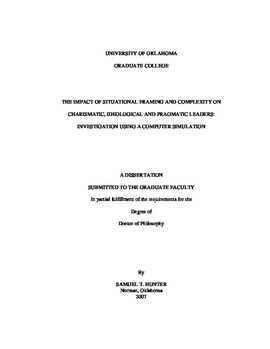| dc.contributor.author | Hunter, Samuel T. | en_US |
| dc.date.accessioned | 2013-08-16T12:20:36Z | |
| dc.date.available | 2013-08-16T12:20:36Z | |
| dc.date.issued | 2007 | en_US |
| dc.identifier.uri | https://hdl.handle.net/11244/1169 | |
| dc.description.abstract | Recent investigations of a new model of outstanding leadership suggest that, in addition to the often-researched charismatic pathway, there exist two additional, yet equally viable, pathways to outstanding achievement: ideological and pragmatic (Mumford, 2006). Despite the compelling results of these initial studies, additional questions remain as to when and under what situational conditions these leaders operate most effectively. Thus, an experiment was conducted to investigate two noteworthy contextual influences: (1) situational congruence with a leader's mental model and (2) environmental complexity. The experiment made use of a computerized leadership simulation where participants took on the role of a university chancellor. Results indicate that leader type, complexity, and situational framing were critical factors in determining leader performance on multiple game performance criteria as well as creative process criteria. Implications and avenues for future research are discussed. | en_US |
| dc.format.extent | vi, 57 leaves ; | en_US |
| dc.subject | Psychology, Industrial. | en_US |
| dc.subject | Leadership Psychological aspects. | en_US |
| dc.title | The impact of situational framing and complexity on charismatic, ideological and pragmatic leaders: Investigation using a computer simulation. | en_US |
| dc.type | Thesis | en_US |
| dc.thesis.degree | Ph.D. | en_US |
| dc.thesis.degreeDiscipline | Department of Psychology | en_US |
| dc.note | Source: Dissertation Abstracts International, Volume: 68-04, Section: B, page: 2697. | en_US |
| ou.identifier | (UMI)AAI3261092 | en_US |
| ou.group | College of Arts and Sciences::Department of Psychology | |
